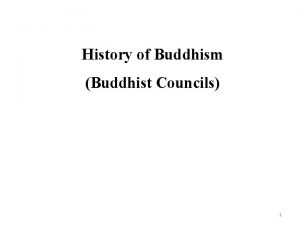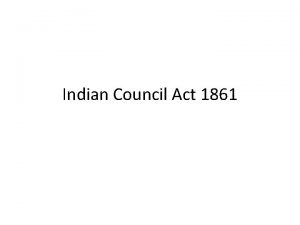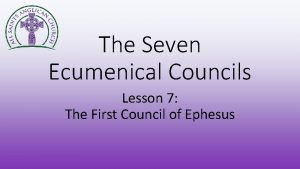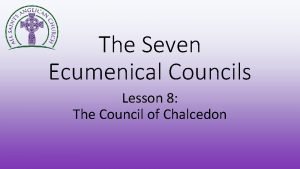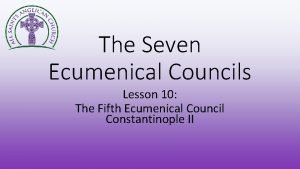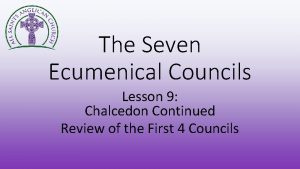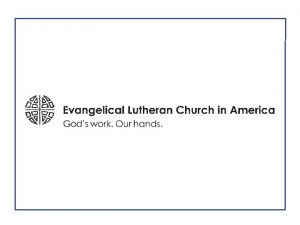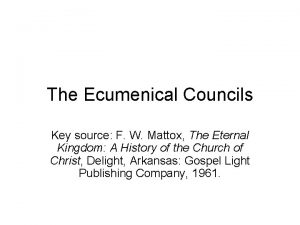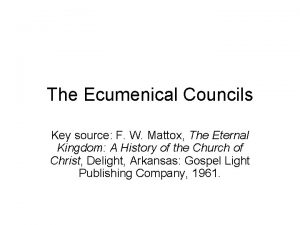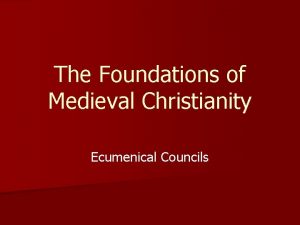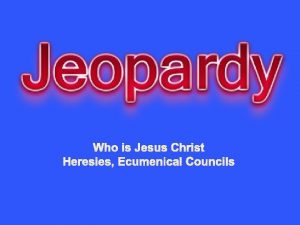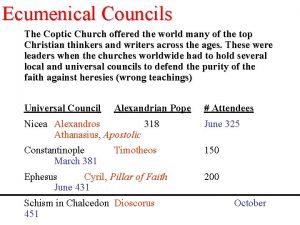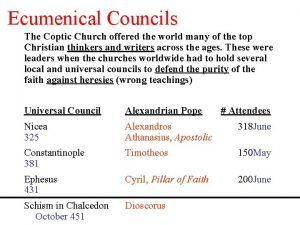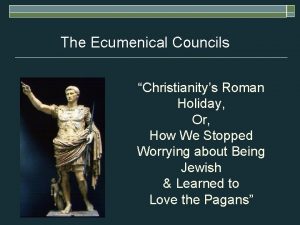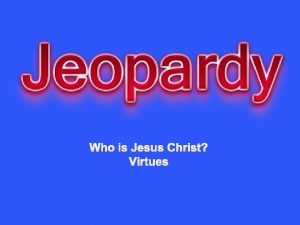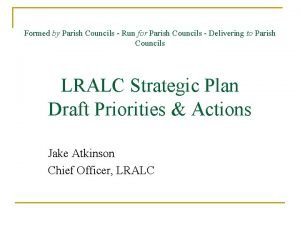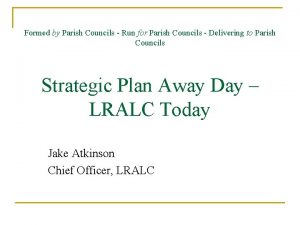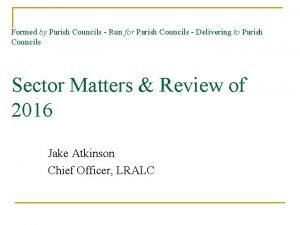The Seven Ecumenical Councils Lesson 6 The First


















































- Slides: 50

The Seven Ecumenical Councils Lesson 6: The First Council of Constantinople

Background to the Council

Antioch vs. Alexandria

Antioch vs. Alexandria • Antioch • Stressed Jesus’ humanity, at times at the expense of his divinity • Had Semi-Arian and Arian tendencies • “Homoiousios” of “Similar Substance” • Jesus is not the God of the OT • Doubted the Spirit’s divinity also • Technically condemned at Nicaea, but lingered

Antioch vs. Alexandria • ὁμοούσιος (homoousios) - “same substance” • ὁμοιούσιος (homoiousios) - “similar substance” • Literally, an “iota” of difference!

Antioch vs. Alexandria • Stressed Jesus’ divinity, at times at the expense of his humanity • Had Modalist tendencies • Not really an issue/controversy for the West at this time

Changing of the Emperors

Changing of the Emperors • Constantine I • Close to Arian clergy, esp. Eusebius • Eventually pardons Arius and allows him to come back • Nicaea still the law of the land • Succeeded by his sons: Constantine II, Constantius II, Constans

Changing of the Emperors • Constantine II • Co-emperor in the West with Constans • Died in battle with brothers three years into his reign

Changing of the Emperors • Constans • Emperor in the West • Brought Athanasius back from exile • Upheld Nicene Christianity

Changing of the Emperors • Constantius II • Emperor in the East, later of the whole Empire • Convinced Arian • Tolerated Athanasius and Nicene Christianity while Constans lived • Condemned Athanasius later, and advanced Arian bishops

Changing of the Emperors • Julian the Apostate • Succeeded Constantius II • Restored paganism as the state religion • Returned all exiled bishops, but diminished their public influence • Did not intentionally persecute Christians, but did not give them public office • Opposed by Athanasius; had him exiled

Changing of the Emperors • Jovian • Succeeded Julian • Reigned 8 months • Restored Christianity as the state religion • Valentinian I & Valens succeeded Jovian

Changing of the Emperors • Theodosius I • Succeeded Valens • Last ruler of a unified Empire • Championed Nicene Christianity • Summoned the Council in Constantinople

St. Athanasius the Great

St. Athanasius the Great • Athanasius contra mundum, • But especially Eusebius of Nicomedia • Present at Nicaea as Alexander’s aide • Champion of Nicene Christianity • “The Black Dwarf” • Served Anthony the Great (Life of St. Anthony)

St. Athanasius the Great • Highly incarnational in his theology - Against the Gentiles - On the Incarnation of the Word • Alexander asked for him on his deathbed to succeed him as bishop, but he ran away into the desert. • Weeks later, he was captured and forced to become the bishop of Alexandria - 328, same year as Arius returned from exile

St. Athanasius the Great • Hated by Eusebius of Nicomedia, et al • Rumors of being a black magician • Rumors of being a tyrant over Egypt’s flock • Rumors of killing Arsenius, a rival bishop

St. Athanasius the Great • Summoned by Constantine to answer the charges – Synod of Tyre • Produced Arsenius! • Afterward tried to get an audience with Constantine in the new capitol, Constantinople • Eusebius convinced Emperor that Athanasius is dangerous and had him exiled to the West. • Eventually was exiled and restored several times

Other Important Figures

Other Important Figures • The Cappadocian Fathers (Asia Minor) • Basil the Great of Caesarea • Gregory of Nyssa, his brother • Gregory of Nazianzus, their friend the hymn-writer • Champions of Nicene theology in a political climate that favored the Arians

Other Important Figures • Apollinaris of Laodicea • How can the eternal Word become incarnate in Jesus? • Tried to reconcile issues from a Nicene perspective

Other Important Figures • The Word (i. e. , God the Son) took the place of the rational soul - Jesus had a physical body. - Jesus did not have a human intellect. - Rather, the Word took the place of his intellect and human soul. • Gregory of Nazianzus: “That which he has not taken up he has not saved. ”

Other Important Figures • St. Jerome • Also Present • Greatest Bible Scholar of the Early Church • Translated from Hebrew and Greek – Vulgate • “Protestant” canon

The See of Constantinople

The See of Constantinople • New Capitol of the Empire (“New Rome”) • Incumbent – Demophilus (Homoian Arian) • When he became Emperor, Theodosius would confirm Demophilus if he accepted the Nicene Creed. He would not. • Theodosius deposed him and ordered him to leave the city.

The See of Constantinople • Became a power struggle between Alexandria and Antioch • Gregory Nazianzus was elected, and was to be confirmed by the emperor. • Maxiumus the Cynic installed by pro-Alexandrian conspirators when Gregory was sick • Interrupted by civil officials mid-consecration

The See of Constantinople • Maximus fled to Thessalonica and appealed to the Emperor • The Emperor charged the bishop of Thessalonica to get the advice of Pope Damasus • Damasus repudiated Maximus and advised the Emperor to hold a council to deal with this and other church issues.

Basics of the Council

Basics of the Council • Date: 381 • Convoked by: Theodosius I • Presided by Timothy of Alexandria, Meletius of Antioch, Gregory Nazianzus, and Nectarius of Constantinople • Attendence: 150 (No Western bishops) • Major Document: Revised Nicene Creed

The Canons of Constantinople 1

The Canons of the Council • Canon 1 • The Faith and Creed of Nicaea was affirmed. • The following heresies are anathematized

The Canons of the Council • Semi-Arians, Macedonians, Pneumatomachi • Taught by the Macendonius, bishop of Constantinople • Rejected the divinity of the Holy Spirit, but rather considered him “external to the one indivisible Godhead. ” • Many persisted in the “Homoiousios” or “similar substance” with regard to the Son (and the Spirit)

The Canons of the Council • Apollinarians • Apollinaris applying Nicene concepts of Christ’s divinity • Affirmed Christ’s divinity • Partially denied his humanity • Human body • Divine, but not human soul/intellect

The Canons of the Council • Apollinarians • Makes Christ into a hybrid between God and man • Grey – a mix between black and white • Mule – a mix between donkey and horse • Spring – a transition between winter and summer

The Canons of the Council • Eunomians or Anomoeans • Founded by Aetius, led by Eunomius • Ultra-Arians • The Son was NOT “like to the Father in essence” • Simply a creature • Disliked homoiousios as much as homoousios

The Canons of the Council • Arians, Eudoxians • Ordinary Arians of the time • Led by Eudoxius who was secretly an Anomoean • Used homoiousios as a bridge to Anomoean thought, though wouldn’t affirm it for political reasons

The Canons of the Council • Sabellians, Modalists • Named for Sabellius, a heretic of prior generations • Son, Spirit, merely different appearances of the Father • Arians accused Catholics of this • Never an organized sect, but a constant reoccurring idea

The Canons of the Council • Marcellians • Named for Marcellus, bishop of Ancrya • Logos was an impersonal emanation from the Father, active in creation, that joined itself to humanity in Jesus. • One day the Logos would retire from Jesus and return to be united to the Father. • Historians question whether Marcellus himself actually taught this or whether it was misunderstandings and bad press

The Canons of the Council • Photinians • Followed Marcellus’ disciple, Photinus, bishop of Sirmium • Went beyond Marcellianism, and insisted on the mere humanity of Jesus

The Canons of the Council • Canon 2 – Limits the authority and jurisdiction of Patriarchs to their regions. Forbids the archbishops from meddling in other Provinces, unless invited. In heathen lands, there is flexibility, however. • Canon 3 – “The Bishop of Constantinople, however, shall have the prerogative of honor after the Bishop of Rome; because Constantinople is the New Rome. ”

The Canons of the Council • Canon 4 – Maximus the Cynic is decreed to never have been a bishop, let alone the rightful bishop of Constantinople. Those ordained by him are not clergy; all he has done is invalid. • Canon 5 – Affirms the “Tome of the Western [Bishops]” regarding the unity of the Godhead, and receive those in Antioch who similarly affirm it. [Probably from a council a year later. We do not know which “tome” is referenced]

The Canons of the Council • Canon 6 – Protected the bishops from accusations by the excommunicated, heretical, or schismatic. Protected the bishops from some civil accusations [Also probably from a council a year later] • Canon 7 – Heretics/Schismatics who repent from some sects are received as baptized Christians who need to be catechized and confirmed. Others are received as heathens who need to be catechized and baptized. The distinction is based on their various beliefs.

The Creed

The Creed • The Creed that comes from Constantinople 1 is essentially the Creed as recited in most parishes today • We, not I • Filioque • See handout for comparison with 325 • Called “Nicene Creed” because it is the mature faith of Nicaea, though it’s technically “Niceno-Constantinopolitan” Creed

The Creed • Filioque – “And the Son” (See NPNF 2 vol 14 Excursus) • Major point of contention between East and West • West recognizes this is not in the original • Not introduced by the Pope, but rather opposed by him originally • Never intended to imply two “Archai” or sources of the godhead

The Creed • Filioque – “And the Son” (See NPNF 2 vol 14 Excursus) • Possibly an unintentional insertion • The Eastern doctrine of the Trinity (cf. St. John of Damascus) has always been the Western doctrine as well. • Latin “ex Patre Filioque procedens” does not imply two sources for the Holy Ghost, though Greek “ἐκπορευόμενον ἐκ του Πατρός καί του Υἱου” does.

The Creed • Filioque – “And the Son” (See NPNF 2 vol 14 Excursus) • First appears circa 400 in Spain in a battle with the Priscillianist heresy. • First officially used in Spain at the Council of Toledo in 589. Evidence that they didn’t realize it wasn’t in the original. Required Goth converts to use it • Rome protested. Not used by a pope in mass until 1014

The Creed • Article V Of the Holy Ghost: The Holy Ghost proceeding from the Father and the Son, is of one substance, majesty, and glory, with the Father and the Son, very and eternal God. • Article VII Of the Creeds: The Three Creeds, Nicene Creed, Athanasius’s Creed, and that which is commonly called the Apostles’ Creed, ought thoroughly to be received and believed: for they may be proved by most certain warrants of Holy Scripture

The Creed • Bp. John Pearson of Chester, An Exposition of the Creed, 1877: • “Now although the addition of words to the formal Creed without the consent, and against the protestations of the Oriental Church be not justifiable; yet that which was added is nevertheless a certain truth, and may be so used in that Creed by them who believe the same to be a truth; so long as they pretend it not to be a definition of that Council, but an addition or explication inserted, and condemn not those who, out of a greater respect to such synodical determination will admit no such insertions, nor speak any other language than the Scriptures and their Fathers spake. ”
 Ecumenical advocacy alliance
Ecumenical advocacy alliance Who patronised second buddhist council
Who patronised second buddhist council Derbyshire association of local councils
Derbyshire association of local councils Sa councils
Sa councils Best practices of catholic pastoral and finance councils
Best practices of catholic pastoral and finance councils Indian councils act 1861
Indian councils act 1861 Customer councils
Customer councils Seven deadly sins seven heavenly virtues
Seven deadly sins seven heavenly virtues Madelyn hunter
Madelyn hunter Hát kết hợp bộ gõ cơ thể
Hát kết hợp bộ gõ cơ thể Bổ thể
Bổ thể Tỉ lệ cơ thể trẻ em
Tỉ lệ cơ thể trẻ em Gấu đi như thế nào
Gấu đi như thế nào Glasgow thang điểm
Glasgow thang điểm Chúa sống lại
Chúa sống lại Môn thể thao bắt đầu bằng chữ f
Môn thể thao bắt đầu bằng chữ f Thế nào là hệ số cao nhất
Thế nào là hệ số cao nhất Các châu lục và đại dương trên thế giới
Các châu lục và đại dương trên thế giới Công của trọng lực
Công của trọng lực Trời xanh đây là của chúng ta thể thơ
Trời xanh đây là của chúng ta thể thơ Mật thư tọa độ 5x5
Mật thư tọa độ 5x5 101012 bằng
101012 bằng độ dài liên kết
độ dài liên kết Các châu lục và đại dương trên thế giới
Các châu lục và đại dương trên thế giới Thơ thất ngôn tứ tuyệt đường luật
Thơ thất ngôn tứ tuyệt đường luật Quá trình desamine hóa có thể tạo ra
Quá trình desamine hóa có thể tạo ra Một số thể thơ truyền thống
Một số thể thơ truyền thống Bàn tay mà dây bẩn
Bàn tay mà dây bẩn Vẽ hình chiếu vuông góc của vật thể sau
Vẽ hình chiếu vuông góc của vật thể sau Thế nào là sự mỏi cơ
Thế nào là sự mỏi cơ đặc điểm cơ thể của người tối cổ
đặc điểm cơ thể của người tối cổ Thế nào là giọng cùng tên
Thế nào là giọng cùng tên Vẽ hình chiếu đứng bằng cạnh của vật thể
Vẽ hình chiếu đứng bằng cạnh của vật thể Vẽ hình chiếu vuông góc của vật thể sau
Vẽ hình chiếu vuông góc của vật thể sau Thẻ vin
Thẻ vin đại từ thay thế
đại từ thay thế điện thế nghỉ
điện thế nghỉ Tư thế ngồi viết
Tư thế ngồi viết Diễn thế sinh thái là
Diễn thế sinh thái là Dot
Dot Các số nguyên tố là gì
Các số nguyên tố là gì Tư thế ngồi viết
Tư thế ngồi viết Lời thề hippocrates
Lời thề hippocrates Thiếu nhi thế giới liên hoan
Thiếu nhi thế giới liên hoan ưu thế lai là gì
ưu thế lai là gì Hổ đẻ mỗi lứa mấy con
Hổ đẻ mỗi lứa mấy con Sự nuôi và dạy con của hổ
Sự nuôi và dạy con của hổ Hệ hô hấp
Hệ hô hấp Từ ngữ thể hiện lòng nhân hậu
Từ ngữ thể hiện lòng nhân hậu Thế nào là mạng điện lắp đặt kiểu nổi
Thế nào là mạng điện lắp đặt kiểu nổi

